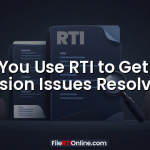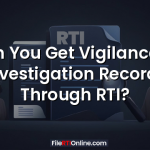Can You Get Information From Schools Through RTI? What Is Allowed and What Is Restricted?
The Right to Information Act, 2005 empowers citizens to seek information from public authorities, including many schools that fall under government control or receive substantial government funding. However, not all information held can be disclosed. Certain categories—especially personal student information—are protected under privacy exemptions.
This article explains what school-related information can be obtained through RTI, what cannot, and uses a real Central Information Commission (CIC) case to illustrate how the law works in practice.
What Type of School Information Can Be Requested Under RTI?
You can generally seek:
1. Institutional Information
· Number of branches or schools under an educational society
· Recognition status
· Affiliation details
· Infrastructure details
· Teacher vacancies and sanctioned posts
· Fee structure
· Admission criteria
· Examination and evaluation procedures
· Scholarships, quotas, reservation policy
· Audit reports or utilisation of government funds
This kind of information relates to the functioning of the institution — not to any specific student’s personal data.
What Type of School Information Cannot Be Disclosed?
Schools cannot disclose information that is:
1. Personal Information of Students
· Admission forms
· Mark sheets (if not belonging to the applicant)
· Attendance records
· Medical information
· Disciplinary records
This is protected under Section 8(1)(j) of the RTI Act — information that relates to personal privacy.
2. Information That Would Burden the Public Authority
If a request requires collecting a large volume of records, manually compiling thousands of pages, or disproportionate diversion of resources, it may be denied under Section 7(9).
CIC Case Example: Request for Student Admission Forms
A real case decided Central Information Commission gives a clear understanding.
Background of the Case
An applicant sought two types of information from the Central Board of Secondary Education (CBSE):
1. Number of branches of Shri Guru Harkishan Public School in Delhi
2. Copies of application forms submitted for admission to Class X and XII for specific academic years
CBSE provided the first part:
· They confirmed there were 11 branches of the school.
But they refused to provide the student application forms, stating:
· The data was huge, requiring disproportionate time and resources
· The forms contained personal information of students, the disclosure of which would violate privacy
CIC Decision
The CIC upheld CBSE’s stand and rejected the appeal.
The Commission agreed that:
· Student admission forms are personal
· Disclosing them would invade privacy
· Collecting and supplying thousands of forms would divert resources disproportionately
What This Case Means for You
You can get:
· Official records about a school’s structure
· Affiliation details
· Fee policies
· Admission rules
· Information on how many seats were available, how many applied, and how selections were made (in general terms)
You cannot get:
· Another student’s admission form
· Personal details of applicants
· Sensitive data protected laws
How to Frame RTI Queries to Get School-Related Information Successfully
Instead of asking for personal documents, ask for aggregate or policy-level information, such as:
· “Provide the criteria used for admission to Class X for the year ____.”
· “Provide the total number of applications received and selected under each category (General/SC/ST/OBC).”
· “Provide a copy of the admission policy for the academic year ____.”
· “Provide the number of sanctioned teacher posts and currently vacant posts.”
These types of requests avoid privacy conflicts and are more likely to be answered.
Conclusion
Yes, you can get information from schools through RTI — but only to the extent it does not invade the privacy of students or cause disproportionate resource burden. Institutional, policy-level, and administrative details are usually available. Personal records and sensitive information are not.
The CIC case clearly shows that RTI cannot be used to obtain personal student documents, but it can still be a powerful tool to ensure transparency and accountability in educational institutions.


